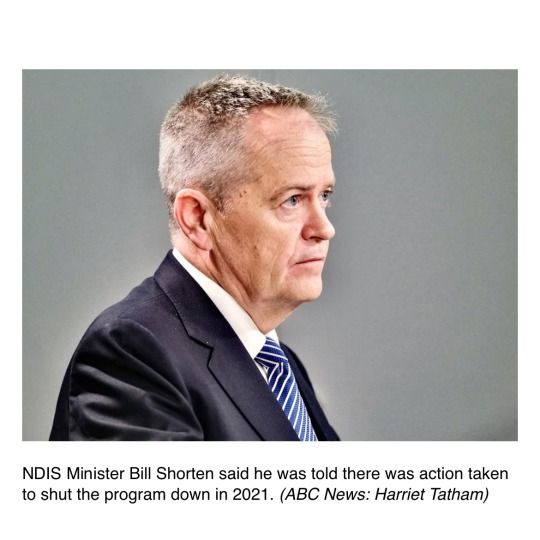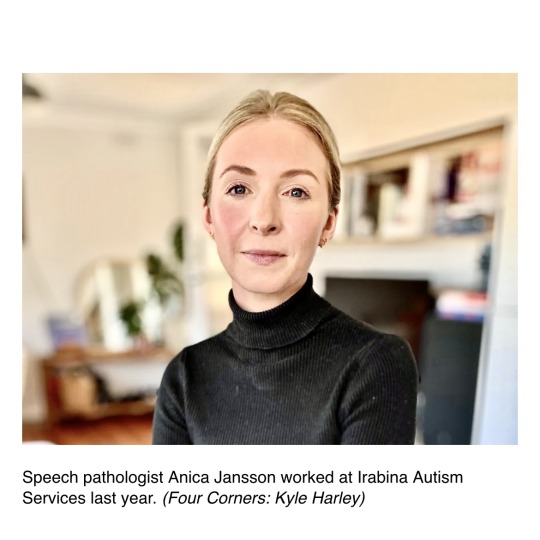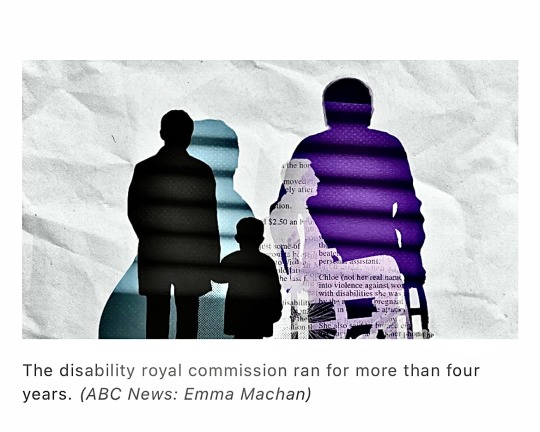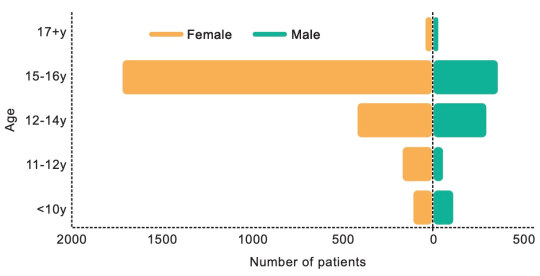#Cognitive-Behavioural Therapy in Australia
Explore tagged Tumblr posts
Text

Overcoming Generalized Anxiety: Effective Management Strategies
Don't let generalized anxiety control your life - take charge with these proven strategies.Modern Minds,180 Albion Rd, Windsor QLD 4030, Australia,[email protected],+61 7 3517 1589,https://modernminds.com.au/
0 notes
Text

NDIS Minister Bill Shorten 'perplexed' controversial practices at Irabina Autism Services continued into last year.
By Anne Connolly
ABC TV - Four Corners
ABC News - 27 September 2023
•

Anica has seen a lot in her job but this experience left her feeling ‘physically shaking’.
ABC Four Corners investigation prompts worker to come forward, saying controversial practices were still happening last year.
By Anne Connolly, Sacha Payne and Sian Johnson
ABC News - 27 September 2023
COMMUNITY WARNING - GRAPHIC CONTENT The following YouTube factual video contains graphic content that may disturb some viewers.
YouTube video >> How the NDIS is failing to protect people with disabilities | ABC TV Four Corners (Series 2023, Ep. 35) - Careless [Released 25 September 2023 / 50mins.+47secs.]:
youtube
Australia's National Disability Insurance Scheme has transformed the lives of thousands of people, but Four Corners exposes criminals, opportunists and registered providers who have been overcharging and defrauding the system.
This episode also contains shocking video showing how a teenage boy with autism was treated during an NDIS-funded therapy session.
•

Australia needs 'social transformation' to be 'truly inclusive', says disability royal commission.
Australia's biggest-ever investigation into the discriminatory treatment of people with disability has handed down its findings, and they make for sobering reading.
The disability royal commission has made 222 recommendations to reduce the violence, abuse, neglect and exploitation of the roughly one-in-five Australians who live with disability.
After more than four years of witness testimony and 'harrowing' evidence, the disability royal commission wants these changes. Here are the key takeaways.
By the Specialist Reporting Team's Evan Young and Leonie Thorne
ABC News - 29 September 2023
•
•

The 10 key points from the Disability Royal Commission
By Natassia Chrysanthos
The Age & The Sydney Morning Herald - September 29, 2023
#Disabilities#Autism Spectrum Disorder#Health#Child health & behaviour#Health policy in Australia#NDIS - National Disability Insurance Scheme#Health administration#Disability health providers services & training#Cognitive behavioural therapies & methods#Disability discrimination exploitation & abuse#Australia’s Disability Royal Commission#Human rights#ABC News Australia#YouTube#The Age & The Sydney Morning Herald
0 notes
Text
microplastics sediment in all organ systems, causing dementia-like symptoms and altered behaviour in mice.
#microplastics#plastics#organ system#dementia#symptoms#behavioural analysis unit#behavioral psychology#cognitive behavioral therapy#behavioral analysis unit#behavioral event network#behavioral health#health#ausgov#politas#auspol#tasgov#taspol#australia#neoliberal capitalism#fuck neoliberals#anthony albanese#albanese government#pollution#pollutants#polluted air#polluted water#polluters#plastic#environmentalism#environment
1 note
·
View note
Text
By: Bernard Lane
Published: Apr 14, 2024
Nine of the 15 gender clinics in a landmark international survey for the Cass review have admitted they do not routinely collect outcome data on their young patients.
This survey, together with a new evaluation of treatment guidelines for gender dysphoria, gives unprecedented insights into the workings of gender clinics around the world offering puberty blockers and cross-sex hormones to minors.
In the 2022-23 survey, six clinics said they “routinely collected some outcome data”: one of these clinics gave no further detail; one noted the number of patients discontinuing treatment; another used measures of quality of life; two were taking part in cohort studies; and the sixth clinic repeated some baseline assessments. Nine clinics acknowledged “not routinely collecting outcome data.”
The report of the survey results1, published by researchers from the University of York earlier this month, identified clinics by country, not name. Of the clinics that took part, Australia and the Netherlands were prominent with five and four clinics respectively.
Poor data collection was central to the controversy over the London-based Tavistock youth gender clinic.
The Cass review had planned to run a data-linkage study—with help from adult gender clinics—to learn the outcomes of the Tavistock’s 9,000-odd former patients.
The missing long-term data would allow clinicians, young patients and parents to make informed decisions about treatment. The review said it was to be the largest study of its kind in the world.
However, six of the seven adult clinics refused to co-operate. One stated reason was that “the study outcomes focus on adverse health events, for which the clinics do not feel primarily responsible.”
Another adult clinic said, “The unintended outcome of the study is likely to be a high-profile national report that will be misinterpreted, misrepresented or actively used to harm patients and disrupt the work of practitioners across the gender dysphoria pathway.”
On April 12, however, The Times newspaper reported that the uncooperative adult clinics had “bowed to pressure to share [the] missing data”.
Mostly medical
In the York University international survey, ordered by the Cass review, all 15 youth gender clinics said they used a multi-disciplinary team, but researchers concluded there was a “paucity” of psychosocial therapy interventions such as psychotherapy or cognitive behaviour therapy. Five clinics did not offer any of these non-medical interventions in-house.
All gender clinics told researchers that “genital reconstructive surgery”—the creation of a pseudo vagina, for example—was “accessible only from age 18.” The youngest age for “masculinising chest surgery” (a double mastectomy) was reported as 16. In fact, there are documented cases in Australia of 15-year-olds approved for transgender mastectomy. Genital surgery is legally available to minors2 in Australia and practised in America.
“Only five clinics reported routine discussion of fertility3 preferences, and only two discussed sexuality4. Finland was the only country to report routinely assessing for history of trauma5,” the final Cass report says in its commentary on the survey.
In separate studies for the Cass review, three independent reviewers evaluated the quality of 21 guidelines for treatment of gender dysphoria in minors.
Included were international guidelines (from the Endocrine Society and the World Professional Association for Transgender Health or WPATH); documents from North America (for example, the 2018 policy statement from the American Academy of Pediatrics); from Europe (the guideline of the UK Royal College of Psychiatrists, for example, and Denmark’s); as well as guidelines from the Asia-Pacific and Africa.
“WPATH has been highly influential in directing international practice, although its guidelines were found by the University of York appraisal process to lack developmental rigour,” the Cass report says.
The York researchers chart patterns of “circular” cross-referencing between guidelines to create a misleading impression of consensus in favour of the medicalised “gender-affirming” treatment approach.
“The guideline appraisal raises serious questions about the reliability of current guidelines. Most guidelines have not followed the international standards for [rigorous and independent] guideline development. Few guidelines are informed by a systematic review of empirical evidence [the gold standard for assessing the evidence supporting a health intervention] and there is a lack of transparency about how recommendations were developed,” the Cass report says.
“Healthcare services and professionals should take into account the variable quality of published guidelines to support the management of children and young people experiencing gender dysphoria. The lack of independence in many national and regional guidelines, and the limited evidence-based underpinning current guidelines, should be considered when utilising these for practice.”
The Cass report says it is “imperative” that gender clinic staff be “cognisant of the limitations in relation to the evidence base and fully understand the knowns and the unknowns.”

[ Chart: Number of youth gender clinic referrals over time by country. Source: Cass report ]
Bum steer
Staff at the Tavistock clinic misled patients and parents, or failed to correct their misconceptions, according to a new report from the Multi-Professional Review Group (MPRG) given oversight of treatment decisions from 2021.
These shortcomings of clinicians included playing down the extent of the unknowns of hormonal treatment; not explaining that puberty blockers are being used unlicensed and off-label; not challenging the reassuring but false parallel with the licensed use of puberty blockers for precocious (premature) puberty; not discussing the possibility that blockers will pause or slow psychosexual development; and not sharing figures showing the vast majority of children started on puberty blockers will go on to cross-sex hormones supposed to be taken lifelong.
The MPRG was also troubled by clinical documents showing misunderstanding of “the outcome of physical treatments” on the part of patients and parents.
In the York University study of treatment guidelines for gender dysphoria, only two were recommended for use by all three reviewers. These were recent, more cautious policies from Finland and Sweden. Both followed independent systematic reviews showing the evidence base for hormonal and surgical treatment of minors to be very weak and uncertain. Like the Cass review itself, the 2020 Finnish and 2022 Swedish guidelines recognise that puberty blockers are experimental and should not be routine treatment.
Although all the guidelines in the study agreed on the need for a multidisciplinary team to treat gender-distressed minors, the “most striking problem” shown by analysis of these documents was “the lack of any consensus6 on the purpose of the assessment process”, the Cass report says.
“Some guidelines were focused on diagnosis, some on… eligibility for hormones, some on psychosocial assessment, and some on readiness for medical interventions7.
“Only the Swedish and [the 2022] WPATH 8th version guidelines contain detail on the assessment process8. Both recommend that the duration, structure and content of the assessment be varied according to age, complexity and gender development.
“Very few guidelines recommend formal measures/clinical tools to assess gender dysphoria, and a separate analysis demonstrated that the formal measures that exist are poorly validated.”
Nor was there any consensus on “when psychological or hormonal interventions should be offered and on what basis.”
A survey of staff at the Tavistock clinic, undertaken as part of the Cass review, found specialists divided on whether or not “assessment should seek to make a differential diagnosis, ruling out other potential [non-gender9] causes of the child or young person’s distress.”
Arguing for an ambitious research program well beyond a possible clinical trial of puberty blockers, the Cass report says the field of youth gender dysphoria is one of “remarkably weak evidence” where health professionals are “afraid to openly discuss their views” because of vilification and bullying.
“Although some think the clinical approach should be based on a social justice model, the NHS works in an evidence-based way,” the report says.
“The gaps in the evidence base regarding all aspects of gender care for children and young people have been highlighted, from epidemiology through to assessment, diagnosis10 and intervention. It is troubling that so little is known about this cohort and their outcomes.
“Based on a single Dutch study, which suggested that puberty blockers may improve psychological wellbeing for a narrowly defined group of children with gender incongruence [or dysphoria], the practice spread at pace to other countries.
“Some practitioners abandoned normal clinical approaches to holistic assessment, which has meant that this group of [gender-distressed] young people have been exceptionalised compared to other young people with similarly complex presentations.”

[ Chart: Age and sex on referral to the Tavistock clinic from 2018-2022. Source: Cass report ]
Who to trust?
The Cass report says the missing evidence “makes it difficult to provide adequate information on which a young person and their family can make an informed choice.”
“A trusted source of information is needed on all aspects of medical care, but in particular it is important to defuse/manage expectations that have been built up by claims about the efficacy of puberty blockers.
“The option to provide masculinising or feminising hormones from the age of 16 is available, but the [Cass] review would recommend an extremely cautious clinical approach and a strong clinical rationale for providing hormones before the age of 18. This would keep options open during this important developmental window, allowing time for management of any co-occurring [non-gender] conditions11, building of resilience, and fertility preservation, if required.”
The review stresses that “consent is more than just capacity and competence. It requires clinicians to ensure that the proposed intervention is clinically indicated as they have a duty to offer appropriate treatment. It also requires the patient to be provided with appropriate and sufficient information about the risks, benefits and expected outcomes of the treatment.”
“Assessing whether a hormone pathway is indicated is challenging. A formal diagnosis of gender dysphoria is frequently cited as a prerequisite for accessing hormone treatment. However, it is not reliably predictive of whether that young person will have long-standing gender incongruence in the future, or whether medical intervention will be the best option for them.”
Advocates for the gender-affirming approach assert that detransition and treatment regret are vanishingly rare, whereas suicide risk for those denied medical intervention is claimed to be very high.
The Cass report says: “It has been suggested that hormone treatment reduces the elevated risk of death by suicide in this population, but the evidence found did not support this conclusion.”
“The percentage of people treated with hormones who subsequently detransition remains unknown due to the lack of long-term follow-up studies, although there is suggestion that numbers are increasing.”
The report cites three reasons why the true extent of detransition is unlikely to be clear for some time—patients who decide medicalisation was a mistake may not wish to return to their former clinic to announce this fact; there is a post-treatment honeymoon period and clinicians suggest it may take 5-10 years before a decision to detransition; and the surge in patient numbers only began within the last decade.
Faced with uncertainty and a lack of good evidence, those with responsibility—from health ministers and hospital managers down to gender clinicians—rely on treatment guidelines supposed to advise on clinical practice according to the “best-available” evidence and expert opinion.
In the York University guideline analysis, the 21 documents were rated on six domains, the key two being the rigour of their development and their editorial independence.
“[Rigour] includes systematically searching the evidence, being clear about the link between recommendations and supporting evidence, and ensuring that health benefits, side effects and risks have been considered in formulating the recommendations,” the Cass report says.
Only the Finnish and Swedish guidelines scored above 50 per cent for rigour. Only these two documents, the Cass report says, link “the lack of robust evidence about medical treatments to a recommendation that treatments should be provided under a research framework or within a research clinic. They are also the only guidelines that have been informed by an ethical review conducted as part of the guideline development.”
“Most of the guidelines described insufficient evidence about the risks and benefits of medical treatment in adolescents, particularly in relation to long-term outcomes. Despite this, many then went on to cite this same evidence to recommend medical treatments,” the report says.
“Alternatively, they referred to other guidelines that recommend medical treatments as their basis for making the same recommendations. Early versions of two international guidelines, the Endocrine Society 2009 and WPATH 7th version guidelines, influenced nearly all the other guidelines.
“These two guidelines are also closely interlinked, with WPATH adopting Endocrine Society recommendations, and acting as a co-sponsor and providing input to drafts of the Endocrine Society guideline. The WPATH 8th version cited many of the other national and regional guidelines to support some of its recommendations, despite these guidelines having been considerably influenced by the WPATH 7th version.
“The circularity of this approach may explain why there has been an apparent consensus on key areas of practice despite the evidence being poor.”
Sometimes these gender-affirming guidelines seek to buttress a strong evidence claim with a citation to a study that is weak or involves a different patient group.
The Cass report notes that, “The WPATH 8th version’s narrative on gender-affirming medical treatment for adolescents does not reference its own systematic review [of the evidence], but instead states: ‘Despite the slowly growing body of evidence supporting the effectiveness of early medical intervention, the number of studies is still low, and there are few outcome studies that follow youth into adulthood. Therefore, a systematic review regarding outcomes of treatment in adolescents is not possible’.”
Despite WPATH insisting such an evidence review is not possible, this is precisely what health authorities and experts have undertaken since 2019 in several jurisdictions—Finland, Sweden, the UK National Institute for Health and Care Excellence, Florida, Germany, and University of York research commissioned by the Cass review.
Yet in the 8th and current version of its guideline, WPATH makes the confident statement that, “There is strong evidence demonstrating the benefits in quality of life and well-being of gender-affirming treatments, including endocrine and surgical procedures… Gender-affirming interventions are based on decades of clinical experience and research; therefore, they are not considered experimental, cosmetic, or for the mere convenience of a patient. They are safe and effective at reducing gender incongruence and gender dysphoria”.
But WPATH “overstates the strength of the evidence” for its treatment recommendations, the Cass report says.
--
1 In the survey, there was one clinic each from Belgium, Denmark, Finland, Northern Ireland, Norway and Spain. The response rate was 38 per cent.
2 In Australia there is no good public data on trans surgery for minors.
3 Early puberty blockers followed by cross-sex hormones are expected to sterilise young people and may also impair future sexual function.
4 Some sizeable proportion of gender clinic patients might grow up in healthy bodies and accept their same-sex attraction were it not for trans medicalisation, according to testimony from detransitioners, clinicians’ reports and data.
5 Trauma from a history of sexual abuse, for example, or exposure to domestic violence is thought to be among the many possible underlying causes of what presents as gender dysphoria. The Multi-Professional Review Group (MPRG), given oversight of Tavistock treatment decisions from 2021-23, was troubled by the lack of curiosity by the clinic’s staff about the effect of a child’s “physical or mental illness within the family, abusive or addictive environments, bereavement, cultural or religious background, etc.”
6 Critics of the “gender-affirming” treatment approach say it is not mainstream medicine because the “trans child” in effect self-diagnoses while clinicians avoid differential diagnosis and attribute mental health disorders and other pre-existing issues to a “transphobic” society.
7 “In most cases [at the Tavistock clinic] children and parents were asking to progress on to puberty blockers from the very first appointment”, according to the MPRG.
8 In the MPRG’s opinion, the patient notes from the Tavistock “rarely provide a structured history or physical assessment, however the submissions to the MPRG suggest that the children have a wide range of childhood, familial and congenital conditions.”
9 Once referred to the Tavistock, patients typically were no longer seen by child and adolescent mental health services.
10 According to the MPRG, gender dysphoria in the diagnostic manual DSM-5 “has a low threshold based on overlapping criteria, and is likely to create false positives. Young people who do not go on to have an enduring cross-sex gender identity may have met the criteria in childhood. And early to mid-childhood social transition may be influential in maintaining adherence to the criteria. Sex role and gender expression stereotyping is present within the diagnostic criteria—preferred toys, clothes, etc—not reflecting that many toys, games and activities [today] are less exclusively gendered than in previous decades.”
11 The MPRG said it was “notable that until the child and family’s first appointment at [the Tavistock] they have received little, if any, support from health, social care, or education professionals. Most children and parents have felt isolated and desperate for support and have therefore turned for information to the media and online resources, with many accessing LGBTQ+ and [gender dysphoria] support groups or private providers which appear to be mainly ‘affirmative’ in nature, and children and families have moved forward with social transition. This history/journey is rarely examined closely by [Tavistock clinicians] for signs of difficulty [or] regret.”
==
Critics have described "gender affirming care" - that is, sex-trait modification - as "medical experimentation." This is incorrect. In a medical experiment, you actually collect data and monitor the participants in the experiment. They don't do that. They're cowboys violating all medical ethics - "first, do no harm" - for ideology, money or both.
#Bernard Lane#Cass review#Cass report#Dr. Hilary Cass#Hilary Cass#gender affirming care#gender affirming healthcare#gender affirmation#medical scandal#medical malpractice#sex trait modification#medical corruption#World Professional Association for Transgender Health#WPATH#ethics violations#medical ethics#unethical#gender ideology#gender identity ideology#queer theory#intersectional feminism#religion is a mental illness
13 notes
·
View notes
Text


studiovinciguerra
Here’s a comic to celebrate the announcement made today that finally the clinical guidelines for Myalgic Encephalomyelitis so-called Chronic Fatigue Syndrome are finally going to be revised. The guidelines as they are now in Australia (which haven’t been updated in over two decades) recommend physical rehabilitation called Graded Exercise Therapy (or Incremental Physical Activity) which is based on Cognitive Behavioural Therapy so the position being upheld is that it’s all in the mind. The defining symptom of ME (and Long Covid) is if you do something beyond your capacity you will get worse, This is known as Post Exertional Malaise (PEM) or “crashing”. The quality of life for people with severe ME is atrocious - comparable to late stage AIDS or terminal cancer. ME is treated as some kind of late stage capitalism anxiety victim mindset tik tok social contagion and I’m sure that’s true to a very small extent, malingerers exist and so do lazy people. If someone you know thinks they have ME or Long Covid don’t be so quick to dismiss them. It is an invisible disability hidden in plain sight. I shan’t bother editing or proof reading this to give the maximum effect of hysterical ME ally that has been shaken to their very core by this astounding failure of da system.
#mecfs#myalgic encephalomyelitis#chronic fatigue#chronic fatigue syndrome#me/cfs#PEM#post exertional malaise#guidelines#chronic illness#spoonie#disability#invisible illness#comic#ME#CFS#medical gaslighting#psychosomatic
16 notes
·
View notes
Text


Welcome to my corner of the internet....
🩵I'm Jon, 33 and based in the UK
🩵Pretty introverted but once I'm comfortable with you I'm my usual chatty, friendly, weird and nerdy self.
🩵Started this blog as a fitblr about 9 years ago, lost over 6 stone but that was a few years ago now and I've packed it all back on. Realised life is about being happy as I am in the present and less about changing myself for others' opinions. Still want to lose weight and will but in my own time.
🩵I love music, movies, TV, gaming, being creative (photography, art, painting etc), DIY/home improvement, exploring, adventures, tech and more. Sucker for the horror genre and loves 90s slasher movies. Equally, I'm a sucker for romance/rom-com as I'm a hopeless romantic in my heart.
🩵All about self-love, body positivity, mental health awareness/support and just being a kind person. DNI if you are fatphobic, racist, transphobic, Anti-LGBTIQA+ or any other negative group.
----------------
I work a 9-5 office job (😫😂) during the week and also run my own business selling art prints!
My artist name is DRAWSTAX and I started learning digital art in 2017 while going through cognitive behavioural therapy for my depression and anxiety. Started selling my art in 2019 on Etsy and since I've grown and learnt new skills and sold my art to people around the globe, from USA, UK, Sweeden, Germany, Australia and many places in between. Still blows my mind! Check out the links below for my socials or @drawstax for my art Tumblr!
Instagram - Pinterest - Tiktok
My Etsy shop and other Links - bio.site/drawstax
-------------
DM's and asks are always open if you want to say hey but please be patient with me as being introverted I don't always reply straight away. Due to previous experiences, please no dick pics and any NSFW messages or asks, send them to my side blog @fcked-up-demon
Thanks for taking the time to read this and feel free to say hey
#pinned post#about me#get to know me#tumblr about me#new followers#introduction#tumblr introduction#intro#get to know the blogger#personal
27 notes
·
View notes
Text
Factitious Disorder - An overview
N Percent
Gender Male 176 34.2 Female 336 65.4 Marital status Unmarried 62 30.4 Married 97 47.5 Separated/divorced/widowed 45 22.0 Age (years) Total mean 33.5 Male 35 Female 32.8 Total range 18–73 Male range 19–67 Female range 18–73 Comorbid psychopathology 239 46.5 Occupation Health care profession 113 22.0 Others 94 18.3
During hospitalization, 65.8% of patients got a psychiatric consultation. The remaining 34.2% of patients refused or did not have the consultation.
Among the factors considered to be relevant to diagnose these disorders, the exclusion of other organic or psychiatric causes is the most represented, observed in 91.1% of cases.
An atypical presentation is another key issue (89.3%), which implies that the patient’s symptoms or the clinical course of the presumed condition is unusual, sometimes associated with incongruous instrumental findings. In some cases, it is also possible to observe an exacerbation of the symptoms in the presence of the medical staff or, on the contrary, in the absence of any witnesses.
Another important parameter is patient’s unusual behavior (86.2%), followed by treatment failure and/or high disease recurrence (83.7%).
The demographic profile of the sample shows a prevalence of female. The data support the hypothesis of several case reports and reviews that FD occur mainly in women.3,9,10 However, other studies published in the literature show a clear prevalence in male gender. This illusory disagreement finds an explanation in Freyberger’s words, who asserts that there is a prevalence of men in clinical trials for Munchausen Syndrome, while the women are most common in the classic form of FD with a ratio of 3:1.11
A disorder in which one pretends to be sick, by self-injury or making themselves sick.
Therapy
Psychotherapy:To help the patient recognise and acknowledge the problem. Also helps them learn coping skills.
Cognitive behaviour therapy:To bring changes in the person’s thinking and behaviour.
Medication
Antidepressants: To treat the associated depression.
Sertraline . Citalopram
Antianxiety drugs: To treat the associated anxiety.
Lorazepam . Diazepam
Rare (Fewer than 10,000 cases per year in Australia)
Treatments can help manage condition, no known cure
Doesn't require lab test or imaging
Can last several years or be lifelong
Common for ages 20-40
Symptoms of factitious disorder include:
Exaggeration of symptoms
Faking symptoms; inconsistencies in the symptoms reported
Dramatic presentation
Presence of symptoms only while being observed
Willingness and eagerness to have diagnostic tests or other procedures
Long medical records of multiple admissions to different hospitals
Reluctance by the patient to allow interaction of doctors with family members
Having a vast knowledge of the diseases one claims to have
Many surgical scars
Self-harm for example by injecting oneself with bacteria or gasoline
Tampering diagnostic results e.g., by heating a thermometer
Causes
The exact cause is unknown but it is attributed to psychological factors.
Risk factors for developing the disorder include:
Depression
Low self-esteem
Child abuse
History of illnesses that required hospitalisation
Personality disorders
Desire to be a healthcare professional
Loss of a loved one
#factitious disorder#munchausenbyproxy#disorder#actually mentally ill#self sabotage#mental instability#awareness
2 notes
·
View notes
Text
It's absolutely wild how many poorly conducted (or straight up fraudulent) studies get published and given significant airtime. And the damage they do if often irreparable.
I'm all for science. Big believer in the scientific method and the value of well conducted scientific research. But they NEED TO DO SOMETHING to prevent this kind of dodgy bullshit from ever seeing the light of day - because it snowballs - and winding it back is near impossible.
I recently read "The Doctor Who Fooled the World" by Brian Deer. It's all about Andrew Wakefield they guy who started the whole "MMR causes autism" panic. And the story is insane. His initial stance was that giving all three vaccines together was the problem - and he was pushing for them to be delivered separately - because *ding ding* he held a patent for an individual vaccine! The guy straight up falsified results make it look like MMR was causing harm - and even then it didn't hold up, because he couldn't show how giving them separately would be any better.
And the amount of time it took for his study to be flagged as dodgy, for him to be flagged as dodgy... by then it was too late.
And then there's the whole Chronic Fatigue Syndrome PACE trial - a study looking into the effectiveness of Graded Exercise Therapy + Cognitive Behavioural Therapy on ME/CFS. This bullshit study solidified the idea that ME/CFS is all in the patients' heads, that its simply a result of "false beliefs" and "deconditioning". It forced harmful treatments on desperate patients, and it set ME/CFS research back by decades
There were a whole host of things wrong with that trial - but the worst of them is that they changed the criteria for what would be considered as "recovery" half way through.
There's a measure called a physical function score - the higher the score, the more functional you are. In order to qualify for the trial ME/CFS patients needed a score 65 or lower, and the plan was that a score of 85 would constitute "recovery". But half way through the trial they lowered the recovery threshold to 60!
...so if you scored 65 you were simultaneously disabled enough to participate in the trial AND also already "recovered"!
It's because of this study that GET + CBT is still being pushed a valid treatments here in Australia. In order to qualify for disability benefits, you have to have undertaken these "treatments" first, even though GET isn't just ineffective, it literally makes us worse.
Anyway all of this is to say, they really really need to do something about making sure dodgy studies are caught BEFORE they're published.
"don't go grocery shopping when hungry" doesn't work for me because Not Hungry Me cannot conceive of a universe in which food is needed so she buys like a cup of pomegranate seeds and some fancy cheese and thinks that'll get us through the week.
#feeling ranty today I guess#long post#dont know how to tag this#me/cfs#fat phobia#scientific research#vaccine#actually autistic
84K notes
·
View notes
Text
Why Music Therapy is Transforming the Lives of Children with Developmental Delays
Music has long been celebrated for its therapeutic effects on the mind and body, but its role in supporting children with developmental delays has gained significant attention in recent years. Music therapy offers a powerful and creative approach to helping children overcome challenges associated with developmental delays. This approach can enhance their emotional, cognitive, and physical development, providing them with the opportunity to engage in meaningful activities that promote growth and well-being. In particular, music therapy developmental delay has emerged as an invaluable tool for improving communication, social skills, and emotional regulation in children.

The Role of Music Therapy in Developmental Delays
Developmental delays refer to conditions where children do not meet typical milestones in areas such as language, motor skills, or social interaction at the expected age. These delays can stem from a variety of factors, including autism spectrum disorder, Down syndrome, cerebral palsy, and other developmental disabilities. Music therapy uses structured musical interventions to address these challenges, helping children develop skills that may be difficult for them to acquire through traditional therapies.
One of the primary ways music therapy helps children with developmental delays is through its impact on communication. Many children with these delays struggle with verbal communication, making it difficult for them to express their needs and connect with others. Music, however, offers a non-verbal outlet for expression. Through singing, playing instruments, and engaging in rhythm activities, children can communicate and express emotions in a way that feels safe and accessible to them. These activities often provide a bridge between a child's inner world and the external one, allowing them to connect with others even when words are not enough.
Cognitive Benefits of Music Therapy
In addition to improving communication, music therapy offers significant cognitive benefits for children with developmental delays. Research has shown that engaging in music-based activities can enhance memory, attention, and problem-solving skills. For instance, rhythm exercises can help children develop their sense of timing and coordination, which are essential for tasks like reading, writing, and participating in physical activities. Furthermore, listening to music and creating sounds encourages children to focus their attention, enhancing their ability to concentrate on tasks and follow instructions.
For children with developmental delays, these cognitive improvements can have a far-reaching impact. Children who struggle with focus and attention may find it easier to engage in schoolwork or everyday activities. Additionally, music therapy can help to build skills such as sequencing and pattern recognition, which are essential for academic success and general life skills.
Emotional and Social Growth Through Music Therapy
Beyond cognitive and communication benefits, music therapy plays a vital role in emotional regulation and social development. Children with developmental delays often experience difficulty managing their emotions and may struggle with behaviours such as frustration, aggression, or withdrawal. Music, with its soothing rhythms and expressive qualities, can help these children calm down and self-regulate their emotions.
Moreover, music therapy fosters social interaction. Group music therapy sessions encourage children to work together, share instruments, and cooperate in creating music. This can improve their social skills, including taking turns, following group norms, and understanding social cues. Children who might otherwise feel isolated or overwhelmed can find common ground through music, helping them to form relationships and build confidence.
Real-Life Success Stories
Across Australia, music therapy has already made a significant impact in the lives of many children with developmental delays. For example, in schools and therapy centres, children who have difficulty speaking have been able to express themselves through song, while children who struggle with socialisation have thrived in group music sessions. Therapists report that children often develop a greater sense of self-esteem and become more engaged in their daily routines as they progress through music therapy.
0 notes
Text
Exploring EMDR Therapy, Cognitive Behavioural Therapy, and Schema Therapy: Find Expert Help Near You
When it comes to mental health treatment, finding the right therapy can make a significant difference in your well-being. At Resilient Roots, we specialize in several evidence-based therapies to support your mental health journey, including EMDR therapy, Cognitive Behavioural Therapy (CBT), and Schema Therapy. Here’s an overview of each therapy and how you can access these services near you.
EMDR Therapy (Eye Movement Desensitization and Reprocessing) is a powerful approach for addressing trauma and emotional distress. EMDR therapy involves guided eye movements that help process and integrate traumatic memories, reducing their emotional charge. This method is especially effective for individuals struggling with PTSD, anxiety, and other trauma-related issues. Resilient Roots offers EMDR therapy in Sydney and throughout Australia. Our skilled EMDR therapists are trained to provide personalized care to help you navigate and heal from past experiences.
Cognitive Behavioural Therapy (CBT) is another cornerstone of effective mental health treatment. CBT focuses on identifying and changing negative thought patterns and behaviors that contribute to mental health issues such as depression, anxiety, and stress. Through structured sessions, CBT helps individuals develop practical skills to manage their emotions and improve their quality of life. At Resilient Roots, we provide CBT therapy in Sydney, delivering targeted interventions to address a range of psychological concerns and enhance overall well-being.
Schema Therapy is designed for individuals with entrenched patterns of thinking and behavior that often stem from early life experiences. This therapy aims to identify and modify these deep-seated schemas, facilitating long-term change and personal growth. Schema Therapy is particularly beneficial for those dealing with complex psychological issues that have not responded well to other treatments. Resilient Roots offers Schema Therapy throughout Australia, providing a comprehensive approach to help individuals overcome longstanding challenges and achieve meaningful change.
At Resilient Roots, we understand that every individual's needs are unique. Whether you’re seeking EMDR therapy near you, CBT therapy in Sydney, or Schema Therapy across Australia, our dedicated professionals are here to offer the support and expertise you need. Our therapists are committed to providing compassionate, evidence-based care tailored to your specific circumstances.
If you're exploring these therapeutic options and looking for a trusted psychologist, Resilient Roots is here to guide you. Our team of experienced therapists is equipped to help you navigate your mental health journey with effective, personalized treatments. Don’t hesitate to reach out to us for more information or to schedule a consultation. Your path to healing and personal growth begins with the right support, and Resilient Roots is here to help you every step of the way.
0 notes
Text
The Importance of Early Intervention for Children with Autism

Early intervention is crucial for children with autism, offering them the best chance for a successful and fulfilling life. Autism Spectrum Disorder (ASD) is a developmental condition that affects how a child communicates, interacts, and learns. The earlier intervention begins, the more effective it can be in addressing developmental challenges and supporting a child's growth.
Why Early Intervention Matters?
Early intervention involves starting therapies and support services as soon as a child is diagnosed with autism. Research shows that early treatment can significantly improve a child's ability to develop essential skills, such as communication, social interaction, and cognitive abilities. It also helps in reducing behaviours that can interfere with learning and socialisation.
When children receive therapy early, they benefit from a personalised approach tailored to their specific needs. This early support can include speech therapy, occupational therapy, and behavioural interventions. For instance, an autism therapist Blacktown can provide targeted interventions to address each child's unique challenges.
Benefits of Early Intervention
Enhanced Developmental Outcomes
Children receiving early intervention often show better progress in language and social skills than those who begin therapy later. This can lead to improved academic performance and better social relationships.
Reduced Behavioural Issues
Early support helps manage and reduce behaviours such as aggression or self-injury, which can sometimes develop in children with autism. Interventions can also teach children coping mechanisms and adaptive behaviours.
Better Family Support
Early intervention services often include family support, helping parents and caregivers understand autism better and providing them with strategies to support their child's development at home.
Increased Independence
With the right interventions, children with autism can develop greater independence and self-care skills. This can lead to improved quality of life and increased opportunities for the future.
Finding the Right Support
Choosing the right autism therapist is critical in ensuring your child receives the best possible care. In Blacktown, you can find experienced autism therapists who specialise in early intervention strategies. These professionals can assess your child's needs and implement effective treatment plans to support their development.
In summary, early intervention for children with autism is essential for maximising their developmental potential and improving their quality of life. By starting therapy as soon as possible, children benefit from tailored support that addresses their unique challenges and helps them develop crucial skills. Engaging with a qualified autism therapist in Blacktown can significantly impact your child's progress, offering them the best start for a successful future.
Cloud Nine Therapy
17 Patrick St,
Blacktown NSW 2148,
Australia

0 notes
Text
Effects of Autism on Emotion and Behaviour
In Australia, the United States, and Europe, Autism Spectrum Disorder (ASD) is one of the most quickly rising developmental disorders.
It is a long-term developmental disease that affects how a person interacts with people and their environment. "Amplified emotional responses and inadequate emotional regulation" are also associated with ASD (Mazefky et al., 2013).
According to research, people with ASD have difficulty controlling their emotions, which leads to significant behavioural problems. This shows that ASD is associated with poor emotional regulation.
As a result, deviant actions such as aggression, tantrums, and self-inflicted behaviours become apparent signs of this feature.
On the other hand, multiple studies have found that many ASD characteristics correlate with and hinder emotional control efficacy. Language and speech difficulties are two of ASD's hallmarks. Language competency has been connected to emotional competence, which includes communicating one's emotional state to others. However, because children with ASD are unable to grasp their mental state, they may struggle to manage their emotions.
Other ASD features, such as social and cognitive difficulties, cause people with ASD to have trouble controlling their emotions. As a result, they may focus on incorrect information, misread others' motivations, and show a lack of appreciation for other people's ideas and experiences.
To lessen the burden of autism spectrum disorder, one could undertake autism therapy to improve emotions and behaviour.
0 notes
Text
Why Get a Tinnitus Assessment?
If you have ringing in the ears (tinnitus) it’s important to get an assessment. This will be done by an audiologist and usually includes a hearing test.
The good news is that tinnitus is very treatable. There are many different approaches and most people find their tinnitus disappears within 12-24 months of starting treatment.
Causes
Although tinnitus assessment perth is usually associated with hearing loss, there are many other health conditions that can trigger it. Some of these include blood vessel disorders, such as atherosclerosis, high blood pressure, and kinked or malformed vessels; thyroid problems; and migraines and autoimmune diseases such as rheumatoid arthritis and lupus. Other factors that can affect tinnitus are noise exposure, stress, and sleep disturbances.

Some people who have tinnitus say it sounds like ringing, buzzing, roaring, whistling or hissing in the ears. This sound is only heard by the person who has it and can be continuous or intermittent. It can also vary in pitch and tone.
A doctor or audiologist can diagnose tinnitus by doing a physical examination and checking your ears. He or she may also refer you to an ear, nose and throat (ENT) specialist for further tests. If the tinnitus is caused by an underlying health condition, treatment of that disease should help your tinnitus.
Diagnosis
In most cases, tinnitus is caused by an underlying hearing loss. It can appear as ringing, buzzing, humming, or whooshing noises that occur in one or both ears and often impact quality of life.
The first step in diagnosing tinnitus is to see your primary care doctor for a basic exam. They’ll examine your ear canals to check for earwax or fluid, and ask about any medications you’re taking (tinnitus is sometimes a side effect of certain drugs).
If your tinnitus is persistent, an otolaryngologist or audiologist can evaluate it using hearing and tinnitus tests. These can include tympanometry, which measures sound waves reflected by your ear drum, and audiometry to determine how much hearing loss you have. Your doctor may also order neuroimaging, such as an MRI or CT scan, to look for any structural problems in your head and neck that could be the cause of your tinnitus. They might also use electronystagmography, a test that assesses balance and movement.
Treatment
If the ringing in your ears is caused by an underlying condition, such as high blood pressure or a jaw problem, treating the problem may help with your tinnitus. Your GP will check your ears, and may refer you to an ear, nose and throat (ENT) specialist for hearing tests.
Most tinnitus is subjective, meaning that only you can hear it. In some cases, such as pulsatile tinnitus, which sounds like your heartbeat, the sound can be heard by others through a stethoscope or other device.
Treatments include counseling, such as cognitive behavioral therapy, which teaches you to change your reaction to your tinnitus and helps you learn coping techniques. Masking devices play a quiet background noise to make your tinnitus less noticeable. Other treatments include relaxation and stress management. Newer treatments use transcranial magnetic stimulation to reduce neural pathways that are involved in perception of tinnitus. These treatments are usually short-term and work best when combined with counseling.
Follow-up
For some hearing loss in australia, a definite cause of the tinnitus will never be found. This is particularly true for those who suffer from tinnitus associated with a neurological condition such as tinnitus that follows exposure to excessive noise or neurological tinnitus, which may result from a stroke, tumour, head trauma or other conditions.
These patients often find that their tinnitus can be managed in other ways, including using cognitive-behavioural therapy to learn to ignore the tinnitus. Other strategies include avoiding loud noises, taking precautions in the workplace and limiting alcohol, caffeine and nicotine intake.
This scoping review suggests that many help-seekers are dissatisfied with the quality of their healthcare experience, particularly at the initial stages of seeking care. However, satisfaction ratings appear to increase once the patient accesses specialised tinnitus clinics. It would be very helpful if healthcare providers could offer information about and/or refer patients to these services in the initial consultations. This would facilitate patients’ access to the tinnitus treatments that are most effective for them.
0 notes
Text
Navigating Life Transitions: A Psychological Approach to Change Management

Life unfolds through inevitable transitions, each presenting a mix of excitement and challenges. Online psychologists in Australia, specialising in change management counselling, bring insightful support to individuals navigating these life shifts. This piece explores the psychological aspects of change, offering direction on how engaging in online change therapy can contribute to a more seamless transition.
Understanding Life Transitions
The Inevitability of Change
Change is an inherent part of the human experience, encompassing various life transitions such as career changes, relationship shifts, and personal growth. Acknowledging the inevitability of change is the first step toward developing a resilient mindset.
The Role of Online Psychologists in Change Management
Online psychologists serve a pivotal role in assisting individuals during life transitions. Through specialised expertise in change management counselling, they offer personalised guidance to help navigate challenges, seize opportunities, and cultivate resilience.
Building Resilience: A Foundation for Change
Resilience as a Coping Mechanism
Resilience is the ability to adapt and bounce back from adversity. Online psychologists work with individuals to cultivate resilience as a foundational coping mechanism, enabling them to navigate life transitions more easily.
Virtual Resilience-Building Exercises
Online psychologists may incorporate virtual exercises to build resilience. These exercises focus on developing coping skills, self-awareness, and a positive mindset, empowering individuals to face change confidently.
Change as a Catalyst for Personal Growth
Embracing Change for Personal Development
Life transitions provide opportunities for personal growth and self-discovery. Online psychologists encourage individuals to view change as a catalyst for positive transformation, fostering a mindset that embraces new possibilities.
Virtual Personal Development Plans
Online psychologists collaborate with individuals to support personal growth to create virtual personal development plans. These plans outline specific goals, skill-building activities, and strategies for embracing change as a positive force.
Online Change Therapy: A Tailored Approach
Personalised Change Management Counselling
Recognising that each individual's experience of change is unique, online psychologists offer personalised change management counselling. This approach addresses specific concerns, anxieties, and goals associated with the particular life transition.
Integrating Cognitive-Behavioural Techniques Online
Cognitive-Behavioural Therapy (CBT) techniques are often integrated into online change therapy. Online psychologists guide individuals to identify and challenge unhelpful thought patterns, fostering a more constructive perspective on the changes they are experiencing.
Navigating Career Transitions
Thriving in Professional Change
Career transitions, such as job changes or advancements, can be exciting and challenging. Online psychologists specialising in change management provide targeted support to help individuals navigate professional shifts, manage stress, and set career goals.
Virtual Career Exploration Sessions
Online psychologists may conduct virtual career exploration sessions, helping individuals assess their skills, interests, and values to make informed career decisions. This proactive approach aids in smoother transitions and increased job satisfaction.
Relationship Transitions and Change
Navigating Relationship Shifts
Relationship changes can impact one's emotional well-being, whether through marriage, divorce, or other significant events. Online psychologists guide individuals in managing the emotional aspects of relationship transitions and developing healthy coping strategies.
Virtual Couples Counselling for Relationship Transitions
For those undergoing relationship changes, online psychologists may offer virtual couples counselling. This provides a supportive space for communication, conflict resolution, and navigating the emotional landscape of relationship transitions.
Managing Emotional Challenges of Change
Addressing Emotional Responses to Change
Emotions are an integral part of any life transition. Online psychologists assist individuals in understanding and managing their emotional responses, providing tools to navigate uncertainty, anxiety, and other challenges associated with change.
Virtual Emotional Regulation Techniques
Online psychologists may introduce virtual emotional regulation techniques, including mindfulness and stress reduction exercises. These techniques empower individuals to regulate emotions, fostering emotional well-being during change.
Maintaining Well-being During Transitions
Self-Care Strategies for Transition Periods
Life transitions can be physically and emotionally demanding. Online psychologists emphasise the importance of self-care during transition periods, guiding individuals in developing personalised self-care routines that prioritise their well-being.
Virtual Self-Care Planning Sessions
In virtual sessions, online psychologists may collaborate with individuals to create tailored self-care plans. These plans encompass activities that promote relaxation, mindfulness, and emotional well-being, providing a foundation for navigating change.
Conclusion: Empowering Transformation in Times of Change
As we navigate the ever-evolving journey of life, change becomes an inevitable companion. Through their specialised expertise in change management counselling, online psychologists offer support and a road map for transformative growth during life transitions. In the digital age, where accessibility is key, online change therapy emerges as a dynamic force empowering individuals to navigate life transitions with resilience, adaptability, and a renewed sense of purpose. Online change therapy is not merely a response to change, but a proactive strategy for embracing transformation and emerging stronger on the other side of life's transitions.
0 notes
Text
How to choose a Melbourne eating disorder specialist?
It is important to look for an eating disorder therapist that has undergone specialist training. This might be through the Australia and New Zealand Academy for Eating Disorders (ANZED) as part of the Eating Disorder Credential Pathway. By engaging with a psychologist that has ongoing training in this area, you will gain confidence in your treatment approach.

At Positive Wellbeing Psychology, our Melbourne psychology practice comprises of highly skilled psychologists with specialist training in Cognitive Behavioural Therapy for Eating Disorders (CBT-E). Our psychologists have undertaken training with ANZED and hold a special interest in the treatment of body dissatisfaction and eating disorders.
Learn More Here: https://positivewellbeingpsychology.com.au/poor-body-image/
0 notes
Text
The NewCastle NDIS
NDIS participants can choose the treatment, support and care they need through a personalised plan. They are also encouraged to develop independence over time.
Local Area Coordinators are available to help NDIS participants navigate the scheme. They can assist with finding providers, negotiate pricing and invoices, and manage their budget.
Pursue Ability
Using NDIS funding, participants can access a wide range of services. These include home and living, personal care, employment support, and health services. These services can help you live independently and enjoy your life to the fullest. They can also assist you with daily activities, such as bathing, grooming, bowel management, and menstrual management.
The NDIS has a system of rules and regulations called the NDIS Framework. This framework sets the broad criteria for eligibility and individualised funding, while the NDIS Rules are additional laws that provide greater detail about a range of matters.
The NDIS has also announced a new Taskforce to investigate fraud and other issues. This taskforce will use data analytics to identify and co-ordinate action against fraudulent providers. It will also create a digital assurance and prevention model that could be used by other government agencies. This initiative will strengthen the NDIA’s strategic intelligence capability and increase payment integrity across the whole of the NDIS.
Scott Papas
The Newcastle NDIS is a national scheme that aims to support people with disability in all aspects of their lives. Its main criteria for access are age, residence and disability. The NDIS provides a range of supports, from accommodation and community participation to home care and personal assistance. Its goal is to improve the quality of life for those with disabilities and help them participate in their communities.
Pursue Ability offers a range of NDIS approved services, including supported independent living facilities and other residential accommodation options. Its team focuses on psychosocial disability and many of its employees have their own lived experiences, allowing them to offer a highly tailored, knowledgeable and compassionate service.
Professor Bruce Bonyhady, Co-chair of the NDIS Review Panel, will discuss what changes are needed urgently and why tinkering with the current system will not be enough. The event will be streamed live online, with live captioning and AUSLAN interpretation available. The team at Inclusion Australia have also produced an Easy Read summary of the speech.
Essentially Your Choice
Handling the complexities of your NDIS plan can be difficult and stressful. This is especially true if you are dealing with multiple service providers. This is where plan management can help. It helps you navigate the NDIS requirements and claiming categories, and manage your budgets to ensure that you have enough funds to get the support you need.
Essentially Your Choice is an NDIS registered provider providing Support Coordination services in the Newcastle, Maitland, Cessnock and Hunter Regions. They have a team of highly trained and experienced industry professionals that can provide you with a person-centred approach. They can also help you connect with community activities and mainstream or funded supports.
They can assist you with all aspects of your NDIS plan, from initial planning to ongoing monitoring and reviews. You can choose a service that suits your needs and goals, as well as your budget. They can also help you find accommodation and tenancy support if necessary.
Grace Professional Services
Grace is a Clinical Psychology Registrar and is passionate about providing a person-centred approach to treating a wide range of mental health concerns. Her goal is to help her clients live the life they want and achieve their goals. She is trained in a variety of psychotherapeutic modalities including cognitive behaviour therapy (CBT), acceptance and commitment therapy, and dialectical behaviour therapy.
The team at Sunflower Services is small and personalised. They work with their clients in a person-centred framework, getting to know them and their individual goals, personality and unique interests. They also ensure their client’s funds are being spent within budget, assist with plan review reporting and negotiate and find suitable support workers.
With a high-quality service and great value for money, this company is the place to go for your NDIS home cleaning needs. They are highly skilled and have a lot of experience in this industry. You can trust them to give you the best results every time.
0 notes